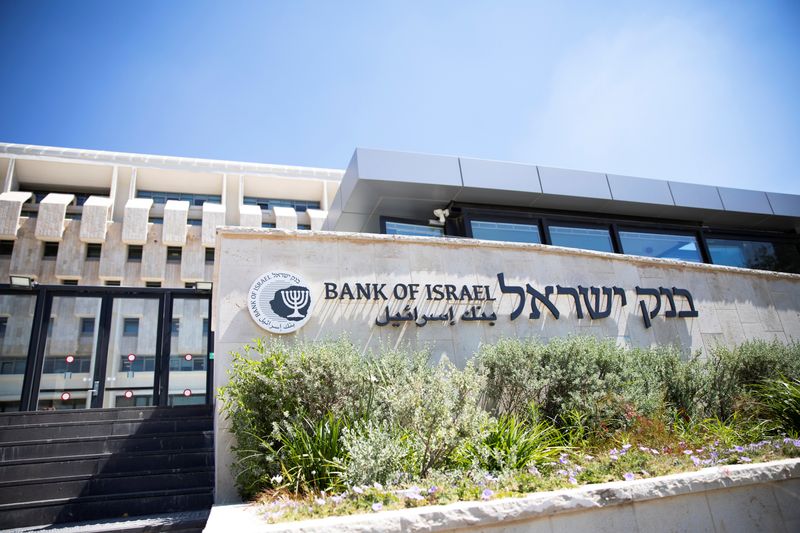By Steven Scheer
JERUSALEM (Reuters) – The Bank of Israel (BoI) will keep short-term interest rates unchanged for a fifth straight meeting on Wednesday, with economists uncertain over the timing of a rate cut due to rising price pressures and the Israel-Hamas war, a Reuters poll showed.
All 15 economists polled said they expected the central bank to hold its benchmark rate at 4.5% when the decision is announced on Wednesday at 4 p.m. (1300 GMT).
Israel’s annual inflation rate accelerated to 3.2% in July from 2.9% in the previous month, moving back above the bank’s 1-3% target range after falling as low as 2.5% in February.
In contrast, Israel’s economy grew by a less than expected 1.2% annualised in the second quarter, according to a preliminary estimate.
“The BoI, in our view, will attach higher weight to higher inflation news rather than to soft growth news,” said JP Morgan economist Anatoliy Shal. It “will continue to err on the side of caution near term, especially as the geopolitical environment remains tense.”
Shal and most other economists expect rates to stay on hold for at least the next few months due to higher inflation, looser fiscal policy and an increase in the risk premium resulting from the 10-month-old war in Gaza against Hamas and fears of an escalation involving Hezbollah and Iran.
“The uncertainty makes it difficult to be confident on the likely timing of the next cut,” said Golman Sachs economist Kevin Daly.
The budget deficit – on the heels of higher defence costs – has surged to 8.1% of gross domestic product, above a 2024 target of 6.6%.
Meanwhile, the U.S. Federal Reserve is likely to reduce rates in September and the European Central Bank is also expected to reduce borrowing costs again next month.
“Unlike the Fed and ECB, the Bank of Israel will continue to stress several inflationary risks, including fiscal policy, a tight labour market, housing price pressures, and supply disruptions,” said Leader Capital Markets Chief Economist Jonathan Katz.
Still, the has moved to a month high of around 3.65 per dollar, gaining 3% so far in August, on a belief that the current conflict is contained and will not turn into an all-out war with Hezbollah or Iran, as well as on expectations of near-term U.S. rate cuts.

The monetary policy committee in January reduced its key rate by 25 basis points, which followed 10 straight rate hikes in an aggressive tightening cycle from an all-time low of 0.1% in April 2022, before a pause last July.
Daly said he had a relatively dovish view on Israeli inflation and rates, believing the inflation rate would ease in coming months while “a reduction in shekel volatility will enable the BoI to resume its cutting cycle later this year”.
